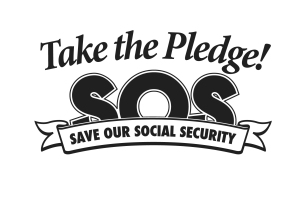Blue Dog Democrat Erskine Bowles and former Republican Senator Alan Simpson, co-chairs of President Obama’s so-called deficit reduction commission, have, metaphorically speaking, delivered a big slap to the face of middle and low income Americans. This slap has come in the form of 50 slides simply entitled Co-Chairs’ Proposal, which are loaded with technical terminology related to arcane aspects of Medicare, Social Security, and fiscal/tax policy.
Why is this document and the process by which it has been produced so contemptuous and disrespectful to all of America but Wall Street and the rich? First, it was conceived in secrecy, without public input, and unloaded on the public as a tactic in a larger strategy to further lower the standard of living of the American middle class. It is highly unlikely that these recommendations will be endorsed by the required 14 of the 18 members of the commission – a requirement for an up or down vote by congress.
Simpson and Bowles knew that and also knew that their proposals would generate an extraordinary amount of noise and bloviation. Their grand strategy is to enlist mainstream media in their propaganda, including such faux-liberal media outlets as the New York Times, NPR, PBS, and MSNBC’s Hardball. They fully intend to push the entire package in a piecemeal fashion.
Second, it is no coincidence that this austerity program for the masses is being unleashed in conjunction with assaults on social programs throughout Europe. We have to see this move as part of the globally integrated and financialized economic system. The IMF, the World Bank, the WTO, and the OECD have evolved into a quasi World government on behalf of the financial services industry and investors. For the past several decades, these organizations have forced “bitter medicine” down the throats of Third World Countries, Southeast Asian countries (after the late 90s financial crisis), Russia (after Perestroika), and South American countries (since the 1970s).
In every case, banks and investors were either enriched or bailed out while social programs were diminished and workers were put out of work. It is now the masses of the advanced industrial societies, e.g., the U.S., England, and France who must pay the price for an economic collapse caused by the international financial casino.
Third, the whole package is duplicitous and dishonest. It is supposed to be all about deficit reduction and saving the U.S. economic system. Slides # 3, 4, 5, 6, and 7 contain 10 “guiding principles and values.” For instance, principle one is stated as follows: “We have a patriotic duty to come together on a plan that make America better tomorrow than it is today.” Other principles indicate that “the solution must be painful,” “it is cruel to make promises we can’t keep,” “protect the truly disadvantaged,” and on and on with platitudinous justification for some economic tough love. But let’s look at what jumps off the pages of these recommendations:
- Slide 20: Freeze non-defense federal salaries for three years and cut the federal workforce by 10%
- Slides 23, 24, 25, 26, 27: Lower corporate and upper income level taxes and eliminate middle class tax deductions.
- Slide 29: Increase gas tax by 15 cents and change to a “chained CPI” (the chained CPI will unfairly result in a reduction in Social Security and other cost of living increases).
- Slides 31, 32, 33,34, 35: Increase co-pays for Medicare beneficiaries and reduce payments to doctors.
- Slides 43, 44, 45, 46, 47, 48, 49, 50: These slides pertain to Social Security. The recommendations include increasing retirement age (slide 45). There are a few good things such as raising the taxable maximum to capture 90%; however, this would be phased in by 2050.
Fourth, and finally, the proposal is as outrageous for what it doesn’t include as what it does include. Although there are plenty of benefit reductions for the masses and tax cuts for the rich, you will not find the following amongst the proposals:
- A sensible inheritance tax. As it stands now, there is no inheritance tax. In fact, in 2010, there is literally no inheritance tax. Heirs of multi-millionaires and billionaires this year will pay no taxes on what they inherit. In other years, slick tax accountants help the super-rich and the not so super rich avoid inheritance taxes with gimmicks in the tax code.
- A financial transaction tax. A small tax on financial transactions would be hardly be felt by the moguls on Wall Street but would generate enough revenue to cover a significant amount of the gap between expenditures and revenue. Even though it was the speculation and gambling of financiers that caused economic collapses across the past few decades, they are not forced to bear even a small part of the pain.
- Increase in the capital gains tax, even for the billionaire hedge fund managers who should be paying taxes at the same rate as every other income earner (as opposed to investor).
- Elimination of the Bush tax cuts for the rich. Need I say any more about that? It looks as though President Obama is ready to cave on that one. But you can bet he will take the Simpson-Bowles insult to salary and wage earning Americans seriously.
This post has been a very brief overview of the co-chairs recommendations. The recommendations should not be taken seriously but they will be. You will see the likes of Alice Rivlin on the PBS Nightly Business Report pontificating about the need to make hard choices. But this whole process is all about the bond markets. In spite of the bone or two thrown to the masses, the suffering will be felt by middle and low income Americans and benefits will accrue to investors and corporations. Having commandeered the IMF and World Bank, this has been the pattern of the global economic elite for the past several decades.
I will keep blogging about this very serious attempt to take down the middle class. Or, I should say, a serious attempt to take us further down.





